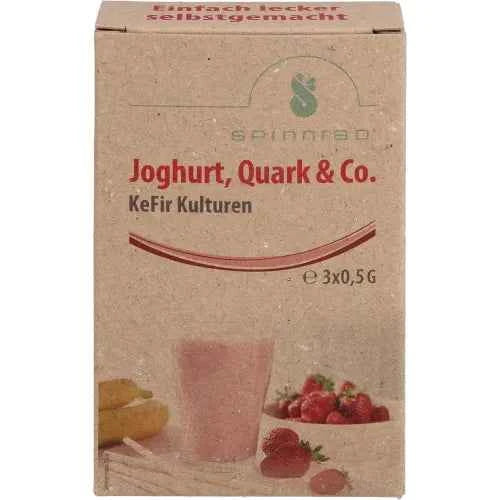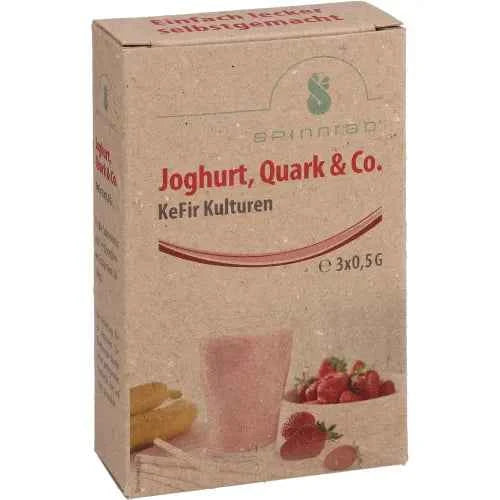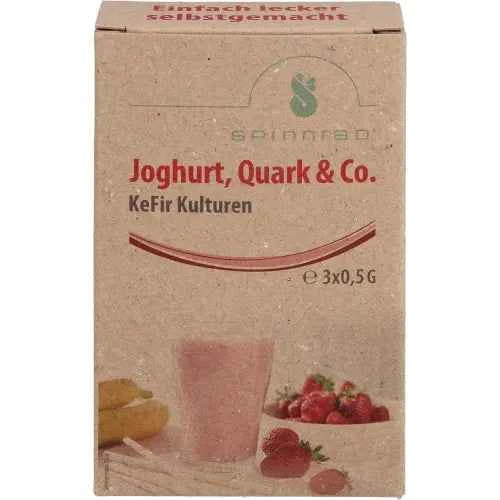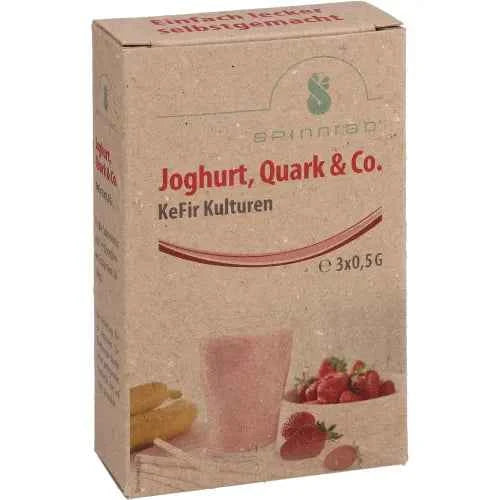Spinnrad GmbH
KEFIR culture granules
KEFIR culture granules
Couldn't load pickup availability
KEFIR culture granules
3X0.5 g
Kefir, a fermented milk drink, offers numerous health benefits due to the probiotic bacteria and yeast found in its culture granules. These beneficial microorganisms support gut health, boost the immune system, and potentially aid in other health areas like digestion, bone health, and blood pressure.
Specific Benefits of Kefir Culture Granules:
Gut Health:
Kefir's probiotics help balance the gut microbiome, improve digestion, and potentially reduce symptoms of inflammatory bowel disease.
Immune System Support:
Probiotics in kefir can strengthen the immune system by helping to fight off harmful bacteria and supporting a healthy gut environment.
Bone Health:
Kefir is a good source of calcium, which is essential for strong bones and may help prevent osteoporosis.
Cardiovascular Health:
Some studies suggest that kefir may help lower blood pressure and manage cholesterol levels, potentially reducing the risk of heart disease.
Digestive Health:
Kefir may aid in digestion and alleviate symptoms of lactose intolerance.
Other Potential Benefits:
Research suggests kefir may have antibacterial properties, contribute to weight loss, and potentially even offer benefits for allergies and asthma.
How Kefir Culture Granules Work:
The kefir grains are a symbiotic culture of bacteria and yeast that ferment lactose in milk, producing a variety of beneficial substances. These include probiotics that colonize the gut, as well as postbiotics (byproducts of fermentation) that further support gut health.
Important Note: While kefir offers many health benefits, it's important to note that individual responses can vary. It's always a good idea to consult with a healthcare professional before making significant dietary changes, especially if you have any underlying health conditions.
Kefir grains are small, white, gelatinous clumps that contain billions of beneficial microorganisms. They are used to ferment milk, or other liquids, into a probiotic-rich drink called kefir. The grains are essentially starter cultures for this fermentation process, enabling you to make kefir at home.
Organic Milk Kefir Grains
Here's a more detailed look at the uses of kefir grains:
1. Making Kefir:
Milk Kefir:
Kefir grains are primarily used to ferment dairy milk (cow's, goat's, etc.) into a delicious and healthy drink. The grains introduce bacteria and yeast that break down the milk sugar, producing a tangy, probiotic-rich beverage.
Water Kefir:
While milk kefir grains can be used in milk, water kefir grains are specifically designed to ferment sugar water (or other liquids like coconut water) into a fizzy, probiotic-rich drink. Water kefir grains are often a great option for lactose-intolerant individuals.
Other Liquids:
Some people experiment with fermenting non-dairy milks like coconut milk, but the results can be less consistent compared to dairy milk, and the texture may not thicken as much.
2. Beyond Fermentation:
Nutritional Boost:
The kefir produced from kefir grains is packed with probiotics, vitamins (A, D, K, B vitamins), minerals (calcium, magnesium, potassium), and other beneficial compounds.
Probiotic Source:
Kefir grains themselves contain a diverse population of probiotics that can help support gut health and boost the immune system.
Health Benefits:
Kefir, made with kefir grains, is known for its potential to improve digestion, boost immunity, and contribute to overall health.
Homemade Yogurt:
Kefir grains can also be used to create a fermented yogurt-like product, though it will have a slightly different flavor and texture than traditional yogurt.
3. Handling and Caring for Kefir Grains:
Growth:
Kefir grains multiply as you make kefir, so you can either increase the amount of milk you're fermenting or pass the extra grains to others.
Storage:
Kefir grains can be stored in the refrigerator, but it's important to keep them moist. Some recommend using them within a few days, but others suggest that they can be stored for weeks.
Cleaning:
It's essential to clean kefir grains regularly to prevent the growth of unwanted bacteria or mold.
Disposal:
If you have too many kefir grains, you can compost them, feed them to chickens or pets, or blend them up with your kefir or smoothies.
Share





